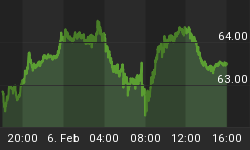What's a millimeter among friends?
Stocks soared late in the day today as the Guardian newspaper in the UK ran a story proclaiming "France and Germany ready to agree €2tn rescue fund." As part of a 'comprehensive' fix, the EFSF would offer "first loss" guarantees, which basically means that if Italy collapse, well, you'd get your recovery plus (for example) 20% back. The purpose of that provision is surely to reduce the write-downs that banks should be taking by 20% - if Italy and Spain go belly-up, having France and Germany pitch in 10% or 20% is actually probably smaller than what everyone assumes they would have to do anyway. A second part of the fix would reportedly reduce the amount that governments would contribute to bank recapitalizations from the €200bln that Christine Lagarde of the IMF says they'll need, and instead put in €100bln (plus, presumably, changing the rules to make banks look like they're better capitalized).
So the bank recapitalization part is less than folks expected to eventually need/get from Europe. And the 'first loss' idea is trés ironic, considering that also today, the EU reached a deal on a law that will "pave the way for an optional ban on naked credit-default swaps on sovereign debt." In other contexts, the EU has stridently talked about making senior bondholders "share the pain" of bank failures, and the ECB has repeatedly said that no CDS-triggering event should happen in Greece, even if there is something that everyone with a brain would consider default. So, given that, what confidence to we have that the EFSF would actually pay up in the event they have to deliver on a trillion or two, rather than carefully interpreting the rules to ensure that the insurance isn't triggered, or simply renege so that paying the insurance doesn't bring down bigger sovereigns?
If equities do this well on a rumored deal that doesn't seem to solve the problem, imagine how well they will do when the problem is solved by letting Greece go!
In being balanced, I ought to point out that the Guardian story came out after earlier reports on Bloomberg attributed a statement to German Chancellor Merkel that officials were moving "millimeter by millimeter" to solve the crisis. Either we were only a few millimeters away from a solution previously (it seemed farther!), negotiations suddenly covered a lot of millimeters (it seemed slower!), or this alleged France/Germany insurance deal doesn't solve the crisis in the view of Chancellor Merkel. On the other hand, French President Sarkozy went out of his way in the Financial Times to promise a big solution coming soon, or else there may be a "resurgence of conflict and division on our continent. He further said that "France on its own cannot cope," which by now is something the whole world presumably understands.
Bonds were nonplused. 10-year yields rose 2bps, and inflation swaps 4bps. Commodities lurched to an unchanged close although energy was up and precious metals down. The dollar was roughly unchanged. But stocks took the bait hook, line, and sinker and rallied 2%. I advise you to look wider than stocks. Investors in most other asset classes are not ready to blow the victory trumpet over the European crisis yet. As if to drive that point home, after the close of trading Moody's cut Spain's rating two notches to A1, and kept a negative outlook.
.
Tomorrow is the monthly CPI report. The consensus call expects a +0.3% rise on headline CPI (which would bring the year-on-year figure to 3.9%) and +0.2% on core CPI (bringing the year-on-year change to 2.1%). Headline inflation will crest soon, at least temporarily, but there is no sign of any abating in core inflationary pressures. Core inflation is running well ahead of our models, and frankly long overdue for a better-than-expected print. But the monthly data keeps confounding that expectation. If the BLS presented us with an 0.1%, it would not change my views at all about the trajectory going forward, but it would complicate the 30-year TIPS auction scheduled for Thursday!
The mechanism for such a slowdown could be housing. The year-on-year rise in the Housing component of CPI is 1.627%. This is higher than one would expect given the pile of inventory that should be keeping a lid on housing prices; the temporary cessation of foreclosures early this year may have artificially let prices rise a bit and if so, then Housing CPI ought to level out at some point and dampen the rise in ex-Housing core CPI. Of course, if inflation is rising because of a broad money-based inflationary effect, then the microeconomic consideration of excess inventory will not keep prices from rising anyway. Too much inventory will lower real prices, but not necessarily nominal prices. Since many of us have lived a majority of our lives in a stable-inflation environment where those were the same thing, i t is understandable that people confuse the two. But supply and demand operate on real prices, not nominal prices.
Housing Starts (Consensus: 590k from 571k) are also due out tomorrow, but that report and the Beige Book are a distant third place in importance behind Europe and CPI.















